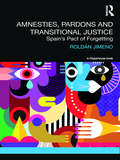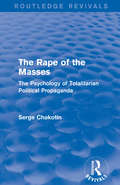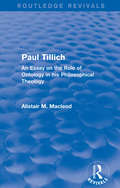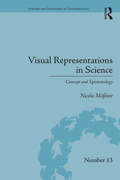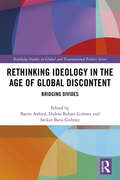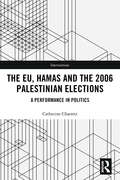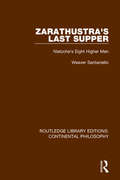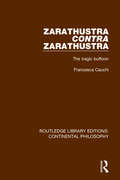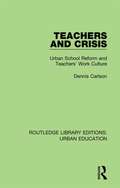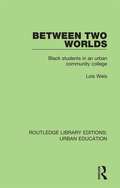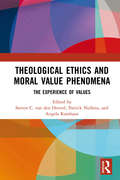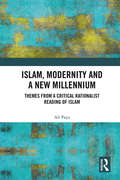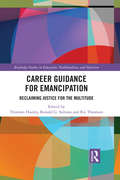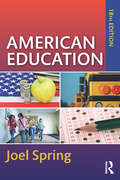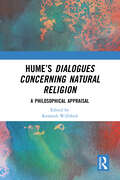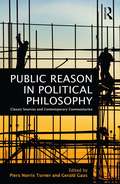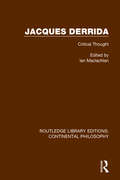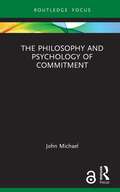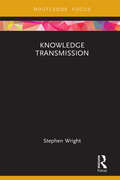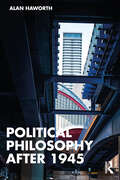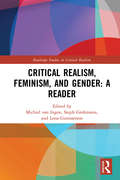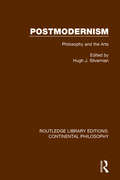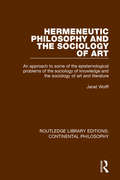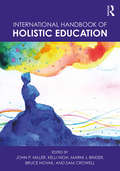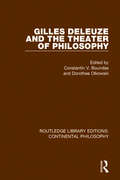- Table View
- List View
Amnesties, Pardons and Transitional Justice: Spain's Pact of Forgetting
by Roldan JimenoIn a consolidated democracy, amnesties and pardons do not sit well with equality and a separation of powers; however, these measures have proved useful in extreme circumstances, such as transitions from dictatorships to democracies, as has occurred in Greece, Portugal and Spain. Focusing on Spain, this book analyses the country's transition, from the antecedents from 1936 up to the present, within a comparative European context. The amnesties granted in Greece, Portugal and Spain saw the release of political prisoners, but in Spain amnesty was also granted to those responsible for the grave violations of human rights which had been committed for 40 years. The first two decades of the democracy saw copious normative measures that sought to equate the rights of all those who had benefitted from the amnesty and who had suffered or had been damaged by the civil war. But, beyond the material benefits that accompanied it, this amnesty led to a sort of wilful amnesia which forbade questioning the legacy of Francoism. In this respect, Spain offers a useful lesson insofar as support for a blanket amnesty – rather than the use of other solutions within a transitional justice framework, such as purges, mechanisms to bring the dictatorship to trial for crimes against humanity, or truth commissions – can be traced to a relative weakness of democracy, and a society characterised by the fear of a return to political violence. This lesson, moreover, is framed here against the background of the evolution of amnesties throughout the twentieth century, and in the context of international law. Crucially, then, this analysis of what is now a global reference point for comparative studies of amnesties, provides new insights into the complex relationship between democracy and the varying mechanisms of transitional justice.
Routledge Revivals: The Psychology of Totalitarian Political Propaganda (Routledge Revivals)
by Serge ChakotinFirst published in French in 1939, and later in English in 1940, this work by the author, analyses and strongly critiques the effect of Nazi propaganda on the psychology of the masses. By bringing together the political and the psychological, the author refers to the use of propaganda in order to serve the ends of a handful of men as ‘psychical rape’ and warns that this phenomenon cannot be attributed solely to the Nazi regime. The English translation was updated to account for the outbreak of the Second World War in 1939. It will be of great interest to anyone studying the Second World War, Nazism, Fascism and the psychology of propaganda.
Routledge Revivals: An Essay on the Role of Ontology in his Philosophical Theology (Routledge Revivals)
by Alistair M. MacleodFirst published in 1973, this is the first book on Paul Tillich in which a sustained attempt is made to sort out and evaluate the questions to which Tillich addresses himself in the crucial philosophical parts of his theological system. It is argued that despite the apparent simplicity in his interest in the ‘question of being’, Tillich in fact conceives of the ontological enterprise in a number of radically different ways in different contexts. Much of the author's work is devoted to the careful separation of these strands in his philosophical thought and to an exploration and assessment of the assumptions associated with them. This book will be of interest to readers of Tillich and philosophers who specialise in ontology and linguistics.
Visual Representations in Science: Concept and Epistemology (History and Philosophy of Technoscience)
by Nicola MößnerVisual representations (photographs, diagrams, etc.) play crucial roles in scientific processes. They help, for example, to communicate research results and hypotheses to scientific peers as well as to the lay audience. In genuine research activities they are used as evidence or as surrogates for research objects which are otherwise cognitively inaccessible. Despite their important functional roles in scientific practices, philosophers of science have more or less neglected visual representations in their analyses of epistemic methods and tools of reasoning in science. This book is meant to fill this gap. It presents a detailed investigation into central conceptual issues and into the epistemology of visual representations in science.
Rethinking Ideology in the Age of Global Discontent: Bridging Divides (Routledge Studies in Global and Transnational Politics)
by Barrie Axford Didem Buhari-Gulmez Seckin Baris GulmezOver the last decade, anti-government demonstrations worldwide have brought together individuals and groups that were often assumed unlikely to unite for a common cause due to differences in ideological tendencies. They have particularly highlighted the role of youth, women, social media, and football clubs in establishing unusual alliances between far left and far right groups and/or secular and religious segments of the society. In this wide-ranging volume, the contributors question to what extent political ideologies have lost their explanatory power in contemporary politics and society. This book aims to contribute to the ongoing debates about the relationship between ideology and public protests by introducing the global context that allows the comparison of societies in different parts of the world in order to reveal the general patterns underlying the global era. Tackling a highly topical issue, this book will be of particular interest to students and scholars of international relations, social movements and globalization.
The EU, Hamas and the 2006 Palestinian Elections: A Performance in Politics (Interventions)
by Catherine CharrettThis book addresses how institutional and diplomatic rituals shaped the European Union’s sanction of Hamas after the latter’s success in the 2006 Palestinian legislative elections. Through a lens of performance and performativity it explains how socialisation and the duress of performative rituals shapes agency and prevents the possibility of being creative with policy initiatives when confronted with difficult decisions. Interviews with senior Hamas representatives, EU bureaucrats, members of the European External Action Service, and electoral observers from Palestine and Europe, in addition to ethnographic research in Gaza and in Brussels, recreate the details of the failed diplomacy between Hamas and the EU. The book explores the social and visual cultures and discourses that shape the recognition of contemporary subjects, and it presents Hamas’s response to being treated as a terrorist movement. It advances queer and postcolonial understandings of European-Palestinian political encounter by interrogating the bureaucratic and professional pressures that shape the political agency of EU civil servants and the recognition of Palestinian politics. This is a performative and interdisciplinary text; it juxtaposes empirical investigation, with critical theory, performance art and everyday experiences. It will appeal to students of International Relations, Interdisciplinary Studies, Middle-East Area Studies, Foreign Policy and Diplomacy Analysis and Gender Studies.
Zarathustra's Last Supper: Nietzche's Eight Higher Men (Routledge Library Editions: Continental Philosophy #11)
by Weaver SantanielloThis book, first published in 2005, explores the historical contextualization of Nietzsche’s thought, focusing on his controversial Thus Spoke Zarathustra. The fourth part of Nietzsche’s Zarathustra consists of Zarathustra’s encounter with eight ‘higher men’ whom Zarathustra meets in succession on his path. The prophet then invites each individual to his cave for the evening festivities, culminating in a blasphemous festival in which his guests worship an ass as God. Revealing each guest’s specific characteristics and distinct roles, the author attempts to discern ‘who’ these guests are or represent (historically) through glimpsing the characteristics specific to each guest.
Zarathustra Contra Zarathustra: The Tragic Buffoon (Routledge Library Editions: Continental Philosophy #10)
by Francesca CauchiThis study, first published in 1998, makes a lively and welcome contribution to the critical analysis of Nietzsche’s seminal classic This Spoke Zarathustra. Through a close textual reading of the neglected and ill-understood part four of the text, the author seeks to show that Nietzsche’s project of self-overcoming is a failure. Offering herself as a philosopher-priestess of the wisdom of pessimism, Francesca Cauchi invokes a complex of responses in the reader, providing a necessary challenge to any and all advocates of life.
Teachers and Crisis: Urban School Reform and Teachers' Work Culture (Routledge Library Editions: Urban Education #1)
by Dennis CarlsonAdvocates of the ‘back-to-basics’ movement argue that a basic skills programme ensures that students are educated to a minimum level of literacy required to enter the labour force. Critics charge that these efforts only increase school bureaucracy and undermine teachers’ autonomy in the classroom. First published in 1992, this book moves beyond the rhetoric surrounding the basic skills debate by providing a thorough yet critical examination of urban education, urban school reform, and teachers’ work culture. Beginning with a sparkling theoretical discussion of the problems and pitfalls of back-to-basics reform efforts, author Dennis Carlson argues persuasively that the movement’s exclusive emphasis on functional literacy skills rather than higher-order thinking assures that students will remain on the lower rungs of the socio-economic ladder. He then proceeds with an empirical study of two urban high school districts in which he documents the latent effects of back-to-basics on teachers’ work lives as well as staff-administration clashes over efforts to implement restructuring programmes. This book offers a sensible and sophisticated treatment of some of the important issues facing urban education and will be of great interest to anyone working in Education.
Between Two Worlds: Black Students in an Urban Community College (Routledge Library Editions: Urban Education #4)
by Lois WeisFirst published in 1985, this book explores the ‘lived culture’ of urban black students in a community college located in a large northeastern city in the United States. The author immersed herself in the institution she was studying for a full academic year, exploring both the direct experiences of education, and the way these experiences were worked over and through the praxis of cultural discourse. She examines in detail the messages of the school, including the ‘hidden curriculum’ and faculty perspectives, as well as the way these messages are transformed at a cultural level. The resulting work provides a major contribution to a number of debates on education and cultural and economic reproduction, as well as a leap forward in our understanding of the role schooling plays in the re-creation of race and class antagonisms. This work will be of great interest to anyone working with minorities, particularly in the context of education.
Theological Ethics and Moral Value Phenomena: The Experience of Values
by Patrick Nullens Angela Roothaan Steven C. Van Den HeuvelThe experience of moral values is often side-lined in discussions about moral reasoning, and yet our values define a large part of our moral motives, standards and expectations. Theological Ethics and Moral Value Phenomena explores whether the experience of a meeting point of the immanent and the transcendent, i.e. the moral self and God, can be the source of our values. The book starts by arguing for a greater theological engagement with value ethics, personalism and the phenomenological method by drawing on thinkers such as Max Scheler and William James. It then provides an understanding of the social and religious dimension of the valuing person, demonstrating the importance of the emotional, as well as the cognitive, dimension of value experience. Finally, this value perspective is utilised to engage with current moral issues such as professional ethics, environmental ethics, economical ethics and family ethics. Integrating the concepts of religious experience, moral motivation, and subjective and objective value within a broad framework of Christian theology and philosophy, this is vital reading for any scholar of Theology and Philosophy with an interest in ethics and moral reasoning.
Islam, Modernity and a New Millennium: Themes from a Critical Rationalist Reading of Islam
by Ali PayaAs the world becomes increasingly globalised Islam faces some important choices. Does it seek to "modernise" in line with the cultures in which it is practised, or does it retain its traditions even if they are at odds with the surrounding society? This book utilizes a critical rationalist viewpoint to illuminate many of the hotly contended issues in modern Islam, and to offer a fresh analysis. A variety of issues within Islam are discussed in this book including, Muslims and modernity; Islam, Christianity and Judaism; approaches to the understanding of the Quran; Muslim identity and civil society; doctrinal certainty and violent radicalism. In each case, the author makes use of Karl Popper’s theory of critical rationalism to uncover new aspects of these issues and to challenge post-modern, relativist, literalist and justificationist readings of Islam. This is a unique perspective on contemporary Islam and as such will be of significant interest to scholars of Religious Studies, Islamic Studies and the Philosophy of Religion.
Career Guidance for Emancipation: Reclaiming Justice for the Multitude (Routledge Studies in Education, Neoliberalism, and Marxism #18)
by Tristram Hooley Ronald G. Sultana Rie ThomsenThis edited collection explores ways in which social justice can be integrated into career guidance practice. Chapter authors propose models and practices which can contribute to struggles for social justice and consider how career guidance can play a role in these struggles. They explore policy and practice in the light of critical social theory both critiquing career guidance and opening up new possibilities for the field. The volume moves the discipline away from its overwhelming reliance on psychology in favor of theoretically pluralistic approaches informed by critical thinking in a range of disciplines. It seeks to expand the possibilities that are available to career guidance practitioners and researchers to support the growth of human flourishing and solidarity.
American Education: From The Puritans To The Trump Era (Sociocultural, Political, and Historical Studies in Education)
by Joel SpringFeaturing current information and challenging perspectives on the latest issues and forces shaping the American educational system—with scholarship that is often cited as a primary source, Joel Spring introduces readers to the historical, political, social, and legal foundations of education and to the profession of teaching in the United States. In his signature straightforward, concise approach to describing complex issues, he illuminates events and topics that are often overlooked or whitewashed, giving students the opportunity to engage in critical thinking about education. Students come away informed on the latest topics, issues, and data and with a strong knowledge of the forces shaping the American educational system. Thoroughly updated throughout, the 18th edition of this clear, authoritative text remains fresh and up to date, reflecting the many changes in education that have occurred since the publication of the previous edition. Topics and issues addressed and analyzed include • The decline of the Common Core State Standards, particularly as result of a Republican-controlled administration currently in place • Increasing emphasis on for-profit education, vouchers, charter schools and free-market competition between schools, expected to surge with the appointment of the new U.S. Secretary of Education Betsy DeVos • Current debates about immigration and "Dreamers"—new statistics on immigrant education, discussion of education proposals to accommodate the languages, cultures and religions of newly arrived immigrants • New education statistics on school enrollments, dropouts, education and income, school segregation, charter schools and home languages • The purposes of education as presented in the 2016 platforms of the Republican, Democratic, Green, and Libertarian parties • Discussions around transgender students
Hume’s Dialogues Concerning Natural Religion: A Philosophical Appraisal
by Kenneth WillifordDavid Hume’s Dialogues Concerning Natural Religion is a philosophical and literary classic of the highest order. It is also an extremely relevant work because of its engagement with issues as alive today as in Hume’s time: the Design Argument for a deity, the Problem of Evil, the dangers of superstition and fanaticism, the psychological roots and social consequences of religion. In this outstanding and unorthodox collection, an international team of scholars engage with Hume’s classic work. The chapters include state-of-the-art contributions on the central interpretive questions posed by the Dialogues as well as major contributions relating the work to contemporary issues in Philosophy of Religion, Philosophy of Science, Moral Psychology, and Social Philosophy. Additional contributions tackle the historical and philosophical background of the Dialogues, relating it to Hume’s own systematic philosophy, to the work of other key seventeenth and eighteenth-century figures – Locke, Clarke, Bayle, Cudworth, Malebranche, Spinoza, Lord Bolingbroke, and Voltaire, among others – to early modern neo-Epicureanism in the life sciences, and, notably, to what Darwin missed by thinking too much like William Paley and not enough like Hume’s Philo. Overall, this volume provides fresh and even groundbreaking perspectives on Hume’s Dialogues Concerning Natural Religion. It is essential reading for students and scholars of Hume, the History of Modern Philosophy, Philosophy of Religion and the History and Philosophy of Science.
Public Reason in Political Philosophy: Classic Sources and Contemporary Commentaries
by Gerald Gaus Piers Norris TurnerWhen people of good faith and sound mind disagree deeply about moral, religious, and other philosophical matters, how can we justify political institutions to all of them? The idea of public reason—of a shared public standard, despite disagreement—arose in the seventeenth and eighteenth centuries in the work of Hobbes, Locke, Rousseau, and Kant. At a time when John Rawls’ influential theory of public reason has come under fire but its core idea remains attractive to many, it is important not to lose sight of earlier philosophers’ answers to the problem of private conflict through public reason. The distinctive selections from the great social contract theorists in this volume emphasize the pervasive theme of intractable disagreement and the need for public justification. New essays by leading scholars then put the historical work in context and provide a focus of debate and discussion. They also explore how the search for public reason has informed a wider body of modern political theory—in the work of Hume, Hegel, Bentham, and Mill—sometimes in surprising ways. The idea of public reason is revealed as an overarching theme in modern political philosophy—one very much needed today.
Jacques Derrida: Critical Thought (Routledge Library Editions: Continental Philosophy #6)
by Ian MaclachlanThis collection of essays on Jacques Derrida, first published in 2004, spans nearly thirty years of critical thinking about Derrida's work. The articles selected here have never previously been collected, yet they are significant contributions that illuminate difficult and important aspects of Derrida's writings. While not seeking to be comprehensive, the volume ranges over the entirety of Derrida's published output and addresses a number of crucial topics, including literature, iterability, the signature, time, alterity, Judaism, metaphor and death. Reprinted here in chronological order of first publication, the essays are complemented by an introduction by Ian MacIachlan which discusses the significance of Derrida's work for our critical thinking.
The Philosophy and Psychology of Commitment (Routledge Focus on Philosophy)
by John MichaelThe phenomenon of commitment is a cornerstone of human social life. Commitments make individuals’ behavior predictable, thereby facilitating the planning and coordination of joint actions involving multiple agents. Moreover, commitments make people willing to rely upon each other, and thereby contribute to sustaining characteristically human social institutions such as jobs, money, government and marriage. However, it is not well understood how people identify and assess the level of their own and others’ commitments. The Philosophy and Psychology of Commitment explores and explains the philosophical and cognitive intricacies of commitment. John Michael considers how commitments motivate us and their often implicit and tacit nature. To flesh out the philosophical framework of his argument he draws on experimental work with young children, adults and human-robot interaction within the context of joint action, considering the role of the emotions and whether very young children are sensitive to commitment. Providing an important account of the nature and operation of commitment, this book is essential reading for those working in philosophy of psychology, cognitive science, experimental philosophy, and social and developmental psychology. It will also be of interest to those working in emerging fields such as human-robot interaction and behavioural economics.
Knowledge Transmission (Routledge Focus on Philosophy)
by Stephen WrightOur knowledge of the world comes from various sources. But it is sometimes said that testimony, unlike other sources, transmits knowledge from one person to another. In this book, Stephen Wright investigates what the transmission of knowledge involves and the role that it should play in our theorising about testimony as a source of knowledge. He argues that the transmission of knowledge should be understood in terms of the more fundamental concept of the transmission of epistemic grounds, and that the claim that testimony transmits knowledge is not only defensible in its own right, but indispensable to an adequate theory of testimony. This makes testimony unlike other epistemic sources.
Political Philosophy After 1945
by Alan HaworthBy the mid-twentieth century interest in political philosophy had dwindled, with one writer even pronouncing the subject ‘dead’. Things were to change in 1971, when the subject experienced a renaissance with the publication of John Rawls’s A Theory of Justice. The story didn’t end with Rawls however, as other avenues through which to approach the subject became available. In Political Philosophy After 1945 Alan Haworth tells the story of political philosophy from the mid-twentieth century to the early twenty-first. First, he considers why the subject should have become marginalised by mainstream philosophical movements such as logical positivism and the ‘ordinary language philosophy’ inspired by Wittgenstein. Subsequent chapters explain the fundamentals of Rawls’s theory, and then compare and contrast his contribution with that of other philosophers from across the political spectrum. These are followed by chapters in which alternative approaches are examined. There are in-depth accounts of works by Hannah Arendt and Alasdair MacIntyre, as well as an evaluation of the claim that political philosophy exemplifies the pursuit of a moribund ‘Enlightenment project’. Throughout the book, Haworth strikes a balance between historical perspective and close analysis of major texts, and he is careful to emphasise the relevance of theoretical issues to questions which arise beyond theory. As such, Political Philosophy After 1945 is essential reading for students and scholars of political philosophy, but also serves as an introduction for students from across the Humanities and Social Sciences approaching the topic for the first time.
Critical Realism, Feminism, and Gender: A Reader (Routledge Studies in Critical Realism)
by Michiel Van IngenIn assessing the current state of feminism and gender studies, whether on a theoretical or a practical level, it has become increasingly challenging to avoid the conclusion that these fields are in a state of disarray. Indeed, feminist and gender studies discussions are beset with persistent splits and disagreements. This reader suggests that returning to, and placing centre-stage, the role of philosophy, especially critical realist philosophy of science, is invaluable for efforts that seek to overcome or mitigate the uncertainty and acrimony that have resulted from this situation. In particular, it claims that the dialectical logic that runs through critical realist philosophy is ideally suited to advancing feminist and gender studies discussions about broad ontological and epistemological questions and considerations, intersectionality, and methodology, methods, and empirical research. By bringing together four new and eight existing writings this reader provides both a focal point for renewed discussions about the potential and actual contributions of critical realist philosophy to feminism and gender studies and a timely contribution to these discussions.
Postmodernism: Philosophy and the Arts (Routledge Library Editions: Continental Philosophy #8)
by Hugh J. SilvermanThis book, first published in 1990, addresses the broad cultural phenomenon that is postmodernism. The first part of the book raises some general theoretical questions about postmodernism – its language and its politics, for example. The second section attends to particular ‘sites’, namely the various arts themselves and the philosophical understanding of them. Here one finds specific readings of architecture, painting, literature, theatre, photography, film, television, dance and fashion.
Hermeneutic Philosophy and the Sociology of Art: An Approach to Some of the Epistemological Problems of the Sociology of Knowledge and the Sociology of Art and Literature (Routledge Library Editions: Continental Philosophy #4)
by Janet WolffThis book, first published in 1975, is an examination of the theoretical foundation of the sociology of art and literature and an in-depth study in the sociology of knowledge. In discussing and clarifying some of the important philosophical issues in this field, the constant underlying reference is to the creative and artistic-expressive areas of knowledge – so that the better understanding of the social nature and genesis of all knowledge may point the way towards a similar comprehension of art and society.
International Handbook of Holistic Education
by John P. Miller Marni J. Binder Kelli Nigh Bruce Novak Sam CrowellProviding a comprehensive overview of holistic education’s history, conceptions, practices, and research, this Handbook presents an up-to-date, global picture of the field. Organized in five sections, the Handbook lays out the field’s theoretical and historical foundations; offers examples of holistic education in practice with regard to schools, programs, and pedagogies at all levels; presents research methods used in holistic education; outlines the growing effort among holistic educators to connect holistic teaching and learning with research practice; and examines present trends and future areas of interest in program development, inquiry, and research. This volume is a must-have resource for researchers and practitioners and serves as an essential foundational text for courses in the field.
Gilles Deleuze and the Theater of Philosophy (Routledge Library Editions: Continental Philosophy #3)
by Constantin V. Boundas Dorothea OlkowskiThis collection, first published in 1994, contains thirteen critical essays by established scholars from the fields of philosophy, literary criticism, feminist theory, politics, and sociology, and a new essay by Deleuze himself. That the contributors are from a variety of fields indicates the extent to which Deleuze’s work can and will impact theory far beyond the discipline of philosophy.
